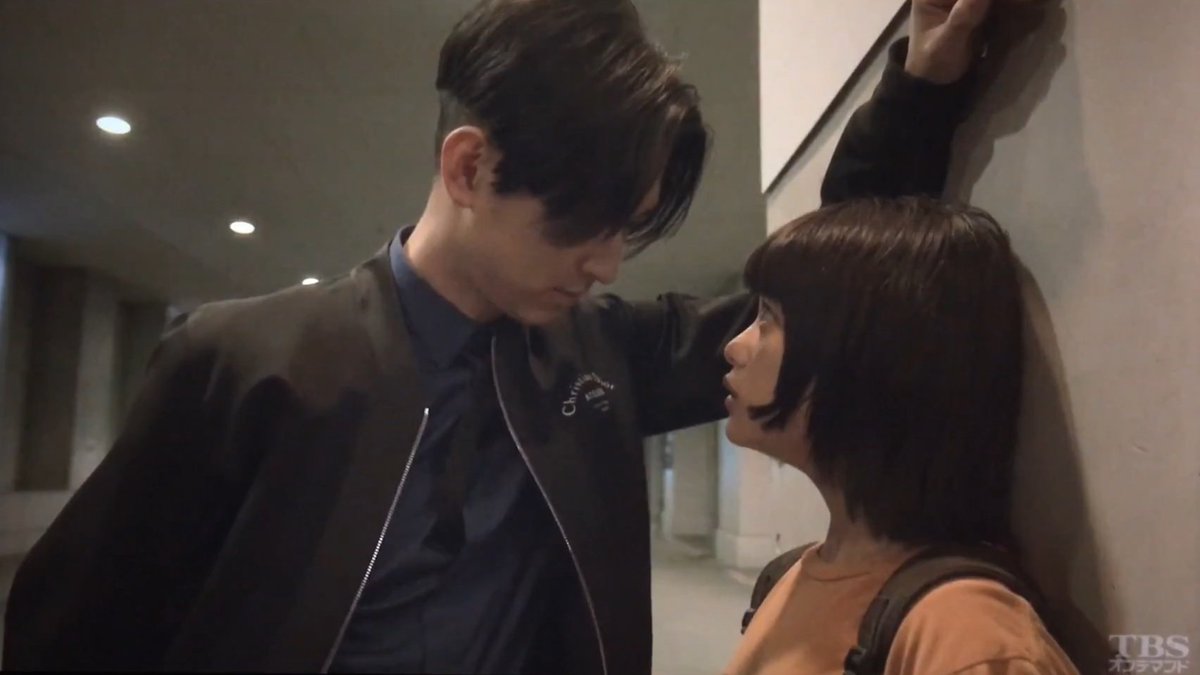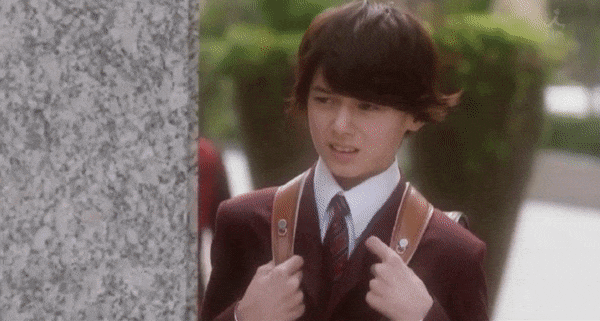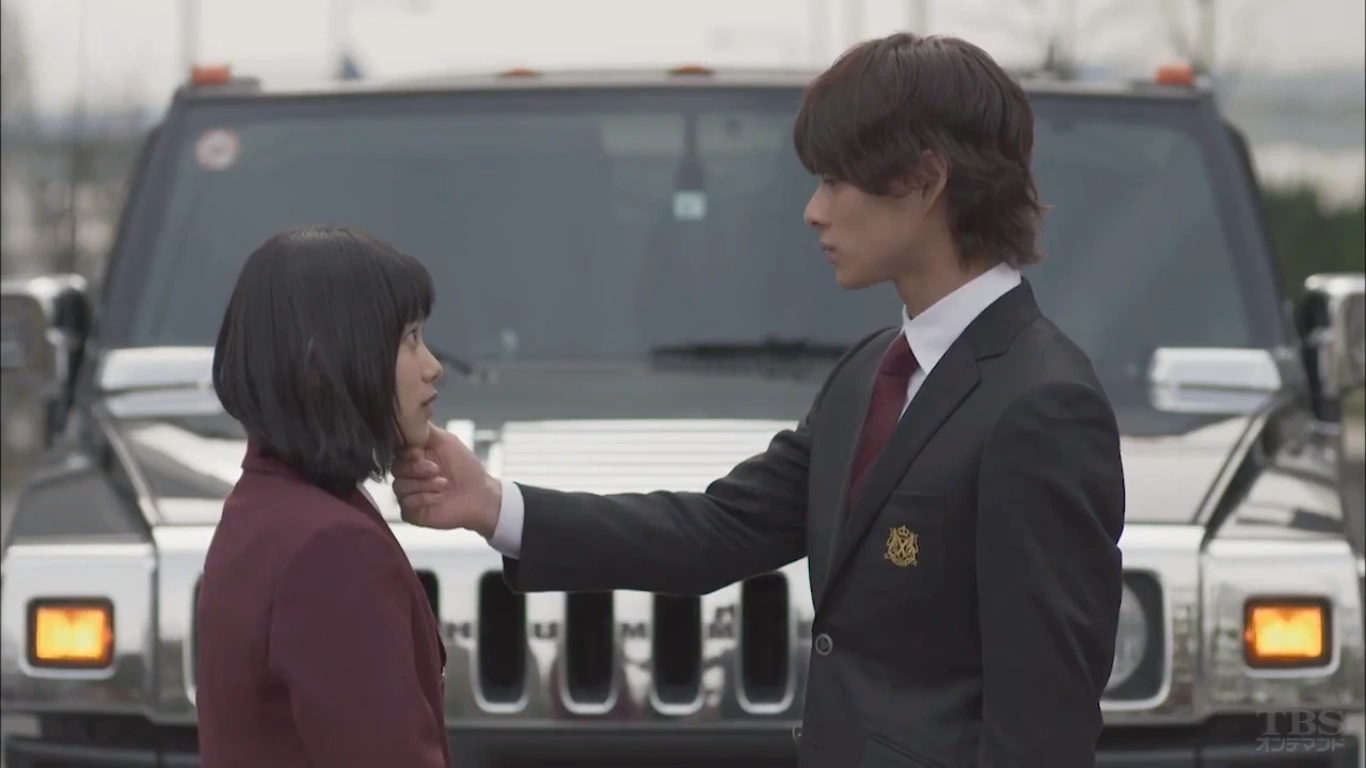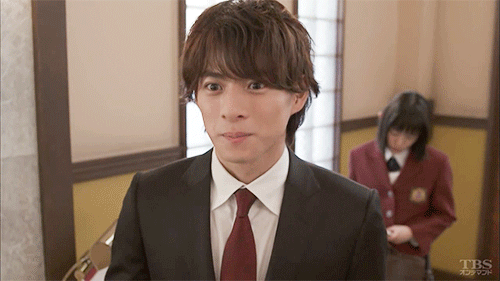What I want to argue is a point that surprised even me, and may not be so readily accepted by hardcore fans. Hana Nochi Hare arguably came into existence so that author Yoko Kamio could milk the fame that the franchise had offered her - it didn't have to be good. But I think Hana Nochi Hare is stronger, as a whole, than its predecessor.
SPOILERS: I talk here assuming that you'll know the story like the back of your hand, the way I do, so assume there will be spoilers for Hana Yori Dango.
I've probably explained it enough, but Hana Nochi Hare slightly twists the poor-girl-meets-rich-boy romance set-up by having the heroine, Edogawa Oto, actually fall from riches herself and attempt to hide it from the elitist students at Eitoku Academy. Essentially, Hana Nochi Hare is about a new generation of students at the school that brought the old characters together.
I always cringe when I hear a premise like this, and generally avoid spin-offs and distant-future sequels as a rule. (This situation is reminiscent of the US drama Once Upon a Time, which similarly recycled its story for a new generation. The difference is that I'm not going anywhere near that train-wreck, which wrote itself into a corner right from the start of season two but is still somehow going strong.)
Firstly, I have a few thoughts about Hana Nochi Hare that didn't make it into my first impression of the drama.
Hana Nochi Hare had a lot to live up to - the characters, I predict, will never become quite as iconic. I think the market for rags-to-riches stories is smaller now, with many opting for more realistic shows - of course, I can't prove that, but wouldn't it explain why ratings for drama have gone down dramatically in the past few years? Well, other than the saturation of the market. Anyhow, I think this indicates that Hana Yori Dango is losing its influence - adaptations keep coming out (see: Meteor Garden 2018), but I'm not sure that the popularity of the franchise is changing much.
That said, the two main characters are great. Hirano Sho is definitely quite green - I heard a lot of people frustrated that a better actor hadn't been cast - but it felt like the role was tailor-made for him. I, for one, thought he was charming. His growth story was the highlight of the drama for me - at first, he was a coward who hid behind confident words, but in the end he learned to fight for himself and emerged a much mentally-stronger person.
 The supporting characters, on the other hand, are nothing to write home about. I think they all were developed enough that they served the purpose they were supposed to in the story - for example, we saw just enough of C5 to believe that they were Haruto's friends, but it was hardly the unbreakable camaraderie of F4. I barely saw enough of strong-baby-face and blond-diet-Nishikado in the first half, and clearly they didn't make enough of an impression if I can't remember their names. (Speaking of Nishikado, his cameo was pretty great. The others were underwhelming, though. We barely saw Matsumoto Jun, but spent an alarming amount of time loitering around his house, and Oguri Shun popped in for no rhyme or reason in a pink hoodie. One would have thought that Mao Inoue would have appeared, since this is linked to the show that put her on the map?)
The supporting characters, on the other hand, are nothing to write home about. I think they all were developed enough that they served the purpose they were supposed to in the story - for example, we saw just enough of C5 to believe that they were Haruto's friends, but it was hardly the unbreakable camaraderie of F4. I barely saw enough of strong-baby-face and blond-diet-Nishikado in the first half, and clearly they didn't make enough of an impression if I can't remember their names. (Speaking of Nishikado, his cameo was pretty great. The others were underwhelming, though. We barely saw Matsumoto Jun, but spent an alarming amount of time loitering around his house, and Oguri Shun popped in for no rhyme or reason in a pink hoodie. One would have thought that Mao Inoue would have appeared, since this is linked to the show that put her on the map?) Okay. Basics covered. Now let's get down to why Hana Nochi Hare is such an engaging melodrama.
Okay. Basics covered. Now let's get down to why Hana Nochi Hare is such an engaging melodrama.For one thing, the character's motivations are always crystal-clear and come from understandable and organic places. Oto may seem frustrating to some people, but for me there was never a moment where I didn't think that the conflict she was having with herself was anything shallow. The original series had this going for it too. I suppose I really liked that, whilst the whole concept of the drama was the barrier between the rich and the poor, almost none of the drama in Makino and Domyouji's relationship spawned from that wealth gap. Makino's hesitance to date him in season two had nothing to do with the fact that they were as different as night and day - in fact, in the first season, she had resolved that she could like him regardless of that. He hurt her, and he had to grovel and make up for it, which is so wonderfully normal. Oto, on the other hand, made her decisions irrespective of whether she would get hurt - she was torn between her own happiness and the happiness of the two people most precious to her. Thus, the sympathetic pangs I felt for her almost rivalled what I felt for Haruto...
Just joking. Obviously all the pathos I can muster went to Haruto, who is clearly a tragic protagonist too innocent for the world. Entertain that idea a little - Haruto's first love was his peripeteia (or reversal of fortune), which put him in a state of perpetual suffering for the remainder of the drama. And yet he rose above it in the end! Definitely one of the best heroes I've seen in a while.
 I'm normally appalled and furious when a show decides to redeem all the villains. In Wolgyesu Tailor Shop, for instance, the family from Hell all became sweet and kind just in time for the last episode, which I still can't comprehend. Hana Yori Dango made that mistake. Remember the girl who got plastic surgery and decided that with her new face she was entitled to everything she'd ever wanted? She was clearly starved for love and deeply unwell, but the drama decided to wrap up her arc by... glossing over her mental illness and turning her into Tsukushi's passive-aggressive friend? That's not okay.
I'm normally appalled and furious when a show decides to redeem all the villains. In Wolgyesu Tailor Shop, for instance, the family from Hell all became sweet and kind just in time for the last episode, which I still can't comprehend. Hana Yori Dango made that mistake. Remember the girl who got plastic surgery and decided that with her new face she was entitled to everything she'd ever wanted? She was clearly starved for love and deeply unwell, but the drama decided to wrap up her arc by... glossing over her mental illness and turning her into Tsukushi's passive-aggressive friend? That's not okay.Hana Nochi Hare did better there. Obviously, the only way to stick conflict in a story is to throw new love interests in like road-blocks, and in classic Hanadan fashion the first - Airi of C5 - is 'evil'. Luckily her redemption happened so early in the drama that it was easy to accept her as a new ally. Moreover, I'm happy that Haruto's more important love interest was a total sweetheart - because isn't that more believable? I feel like when a love interest is made into an obsessive villain, that's just a cheap trick to make their eventual pain and heartbreak feel deserved. Here, someone was destined to be upset in the end, and that hurts better.
 Reading back, I've realised that I'm making out that Hana Nochi Hare can't compare, when in actual fact Hana Yori Dango will always be my guilty pleasure, but I think this series works better. Here's the biggest reason why: Less tonal shifts!
Reading back, I've realised that I'm making out that Hana Nochi Hare can't compare, when in actual fact Hana Yori Dango will always be my guilty pleasure, but I think this series works better. Here's the biggest reason why: Less tonal shifts!The high highs and low lows made more sense together. There were literally only two songs in the soundtrack, and they were always employed in the most effective way. What to take from this insanely long appreciation-post is that this drama made me really happy, and it was a worthy successor to a beloved franchise.



No comments:
Post a Comment